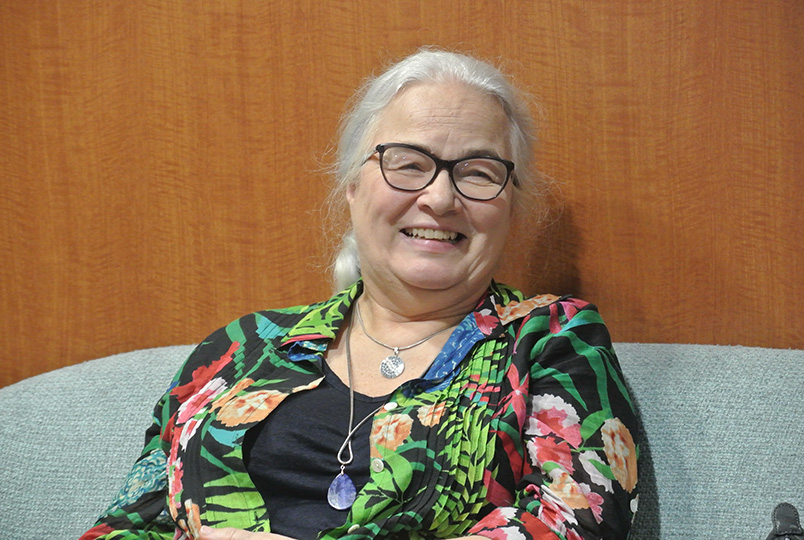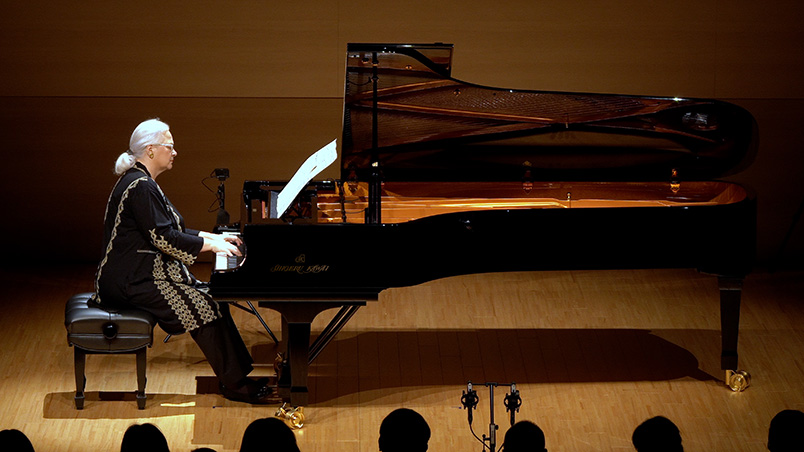NEWS
2024.02.01
Exploring Bach: An Interview with Ewa Pobłocka – Insights into Her Musical Journey and Approach to Performance (Part.1)

In October 2023, Ms. Ewa Pobłocka performed a recital at the Saitama Civic Center Omiya RaiBoC Hall in Saitama and at Kawai Omotesando in Tokyo. During her tour, we had the opportunity to interview her at Kawai Omotesando. Ewa achieved 5th place in the 10th Chopin International Piano Competition and also received the Mazurka Award. In recent years she has been focusing on the music of J.S. Bach, and in this interview shares insights into her encounter with Bach’s music, the allure of his compositions, and her approach to tempo and pedal usage when performing. This discussion will be presented in two parts: the first part and the second part.
Interview / Text: Kyoko Michishita
Text: Kyoko Michishita
Interview Translation: Midori Tamura and Miho Ebihara
―― On October 24th, you had a recital in Omiya, and the next day on the 25th, another one at the Kawai Omotesando in Tokyo.
Yes, I was delighted to see the large audience in both places, and I felt very happy to be able to play Bach which is very special to me.
―― In your recital in Omiya, you played works by Schubert, Chopin and Wagner-Liszt along with Bach.
Yes, all the works I play in my recitals are works that I love. My most favourite work among them is “Isoldes Liebestod” by Wagner transcribed by Liszt, which is very sad in character. When I am asked to give a recital, I am often requested to include works by Chopin, but I intentionally try to include works by other composers too.
I take plenty of time to plan my recital program so that I can consider the combination of all the elements very precisely -such as the connection of the keys and the styles etc.
―― Your recital at the Kawai Omotesando was an all Bach programme. You are a specialist of works by Chopin, but also known as an expert on works by Bach.
I don’t think that’s true, as I play a lot of chamber music and many works by different composers, such as Schubert, Schumann, Mozart etc. But of course, after performing all of the 48 Preludes and Fugues of the “Well Tempered Clavier” I feel that my understanding of Bach is much deeper now compared to when I only played 5 or 10 of them.

Recital at the Saitama Civic Center Omiya RaiBoC Hall
―― Could you tell us about your experiences concerning Bach from your childhood or those that have had a big impact on you?
There was a church I used to go to which was near my house, and that church had an organ which was among the finest in Europe. Organ concerts were held in this church and works by Bach were often played there.
Also, my mother was a singer and she sang a lot of Baroque music, including Bach. Therefore, even as a child, I sang his Cantatas. Bach’s music was always very close to me.
Probably the most influential experience I have had concerning Bach, was listening to all of Bach’s concertos by Philippe Herreweghe. Herreweghe had a performance group called “Collegium Vocale” which he conducted and I listened to all of Bach’s Masses by them as well. Their performances were full of colour and elements of dance, and I learnt a lot about the articulations of Bach and the use of time.
Imagine the conductor rehearsing a Cantata with the orchestra. He has the text of the Cantata in one hand, and explains the meaning of the words to the members of the orchestra. The text helps them to understand what is needed in the performance. I have been performing since I was a child and, as my mother was a singer, I realised that the text plays a great role in a performance. I always feel that words and music are strongly connected.
―― I have heard that you have studied with Ms. Tatiana Nikolaeva too.
Yes, I studied with her and I also have taken masterclasses with other pianists too. I already had my strong views regarding how to perform Bach, but Prof. Nikolaeva was so marvellous and the beauty of her “Goldberg Variations” is to me unrivalled.
I used to have intense discussions with Prof. Nikolaeva, as she had her own opinions of how to interpret Bach while I also had mine.
―― What is the appeal of Bach’s compositions?
Everything. The clarity and lucidity of the forms and styles… the beautiful harmonies, polyphonic melody lines, and the logic behind them. I am also attracted to the mystical elements behind it all.
I remember I was asked the same question by London’s BBC a while ago. At that time, I needed quite a long time to answer those questions, but now, I am quite clear about the beauty of Bach.
In Bach’s music, one sees both the elements of him as a human and the elements of him as a composer- Bach was a profound person. His music came from his devotion to his faith being deeply connected to him as a composer and also as a person. His unprecedented skills of composing and deep devotion enabled him to create the mysterious elements unique to Bach.
Some time ago, I went to Switzerland to be on the jury for a competition with Ms. Akiko Ebi. Mr.Arimune Yamamoto was also with us as a member of the group from Kawai. The adjudication was to start at 10 am, so we left Chamonix quite early at about seven o’clock in the morning to go and see the beautiful scenery. Mont Blanc appeared in front of us, and we had coffee in the beautiful sunlight and then made our way back to the competition to adjudicate. On the way back in the car, Mr. Yamamoto played a CD of my “Well-Tempered Clavier Volume 1” by Bach. I wouldn’t say it was because of my playing, but Bach’s music just penetrated deep into our hearts. Nature ― we felt Bach’s encounter with God and that was an amazing experience.
About Ewa Pobłocka
Ewa Pobłocka achieved 5th place in the 10th Chopin International Piano Competition, simultaneously winning the Mazurka Award. She emerged victorious at the 1977 International Viotti Music Competition and the 1979 International Festival of Young Laureates in Bordeaux. In 1981, she graduated at the top of her class from the current Academy of Music in Gdańsk. After studying with Conrad Hansen at a university in Hamburg, she continued her musical education under Rudolf Kehrer, Tatiana Nikolaeva, Marta Argerich, and others.
Pobłocka has graced major concert halls worldwide, collaborating with orchestras and conductors such as the London Symphony Orchestra and the Bavarian Radio Symphony Orchestra. Proficient in chamber music, her repertoire spans from Baroque to contemporary music. With over 50 released CDs on labels like Deutsche Grammophon, Polski Nagrania, CD Accord, and Bearton, she has garnered awards and high praise from critics. Notably, her recording of “The Well-Tempered Clavier, Book I” on the NIFC label with a Shigeru Kawai SK-EX piano received acclaim, selected as an outstanding album by Gramophone Magazine and Record Geijutsu.
Known as an outstanding educator, Pobłocka currently teaches at the Feliks Nowowiejski Academy of Music in Bydgoszcz, Poland. She has previously served as a visiting professor at Tokyo University of the Arts and Nagoya University of the Arts in Japan. Conducting masterclasses worldwide, she has also served as a jury member for prestigious international piano competitions such as the Chopin International Piano Competition (2005, 2015, 2021), the Arthur Rubinstein International Piano Master Competition (2021), and the Hamamatsu International Piano Competition (2012).
Ewa Pobłocka has been actively involved in writing, publishing the book “Forte-piano” in 2021. Since around 2018, she has focused extensively on the music of J.S. Bach, hosting radio programs in Poland titled “Start with Bach” and “Bach’s Cases.” Her Bach-focused activities include completing the recording of The Well-Tempered Clavier, a Bach recital series scheduled at London’s Wigmore Hall in 2021-22, showcasing her dedication to the timeless works of the great composer.

